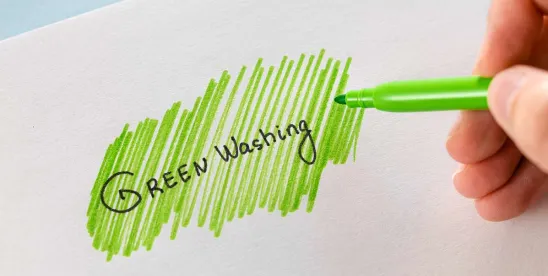Companies should take note – there is increased global scrutiny around environmental or green marketing, or so-called “greenwashing,” claims. These claims stem from alleged wrongdoing in companies’ marketing representations and public disclosures, ranging from recycling to PFAS to climate change, and more. Varying requirements in different jurisdictions make it essential that companies understand these requirements before promoting the environmental benefits of products, services, or the manner in which they operate overall in their respective markets.
U.S. Environmental Marketing Frameworks
The Federal Trade Commission's (FTC or the Commission) Guides for the Use of Environmental Marketing Claims (Green Guides) provide guidance on general environmental marketing principles, how consumers may interpret claims, and how marketers can avoid deceiving consumers or otherwise substantiating these claims. The FTC is refreshing the Green Guides, which it last updated in 2012, and requested comment on both new and existing terms. For instance, the Commission sought advice on whether to consider revising or providing additional guidance on the following terms: “carbon offsets,” “climate change,” and “compostable.” It is also considering whether to replace certain examples or otherwise update guidance on terms like “energy use,” “energy efficiency,” and “recyclable content” and claims for the terms “organic” or “sustainable.” Additionally, the FTC is considering whether to make the Green Guides enforceable, giving the Commission the power to seek civil penalties for violations.
Plaintiffs are increasingly using the Green Guides to establish the standards for unfair or deceptive advertising. While all states have laws prohibiting unfair or deceptive conduct, some states have additionally adopted the Green Guides’ standards as enforceable state law, while others have incorporated compliance with the Green Guides as a safe harbor.
International Green Marketing Frameworks
- European Union: The European Union recently approved the Directive on Empowering Consumers for the Green Transition (Directive), which entered into force on March 26, 2024. The Directive aims to ban misleading product information in part by prohibiting a range of green marketing messaging as well as restricting companies from using a sustainability label that is not based on an established certification scheme. The European Parliament recently adopted its position on the Green Claims Directive and will return to the Directive after the European Parliament elections in June. The Green Claims Directive will complement the Empowering Consumers for the Green Transition Directive.
- Australia: The Australian Competition & Consumer Commission published guidance for businesses making environmental claims in December 2023. It includes eight principles for trustworthy environmental claims: 1) make accurate and truthful claims; 2) have evidence to back up your claim; 3) do not hide or omit important information; 4) explain any conditions or qualifications on your claims; 5) avoid broad and unqualified claims; 6) use clear and easy-to-understand language; 7) visual elements should not give the wrong impression; and 8) be direct and open about your sustainability transition.
- United Kingdom: The United Kingdom’s Advertising Standards Authority published an update to its advertising guidance on misleading environmental claims and social responsibility in June 2023. Generally, marketing communications must not mislead consumers about a product’s environmental benefits. Marketers must ensure that the claims they make can be substantiated. There is a stricter standard with relative claims, such as “greener” or “friendlier.” Additionally, general claims such as “good for the planet,” or “zero emissions” should not be made without qualification or proof that the claim applies to the entire product or service lifecycle.
Risky Business – “Greenwashing” Litigation
Companies increasingly find themselves defending allegations of misrepresenting the environmental benefits of their products or services, pejoratively labeled “greenwashing.” Plaintiffs typically challenge companies’ efforts to market their products or services as more environmentally friendly, focusing on claims such as “sustainable” or “recyclable.” While environmental marketing claims initially focused on specific unsubstantiated claims (e.g., a particular product is not recyclable as claimed), more recent litigation has gone beyond representations regarding products or services and cited broader statements as underpinning claims, such as long-term sustainability goals, net zero emissions goals, or industrywide terms of art, for example, “degradable” or “bio-degradable.” In civil litigation, plaintiffs typically argue that such statements violate state consumer protection laws, constitute fraud, fraudulent inducement and/or breaches of warranty, and result in the companies’ unjust enrichment. Increasingly, environmental marketing claims are also subject to government enforcement actions by state attorneys general.
State AG Enforcement
Notably, the State of New York is leading the charge on a new wave of greenwashing enforcement cases basing claims on general statements. First, in February 2024, the New York Attorney General brought an enforcement action alleging that JBS USA Food Company and JBS Food Company Holdings (JBS) misled the public about the environmental impacts of its operations and marketed sustainability to increase sales.1 New York alleges JBS committed to reducing its emissions to “Net Zero by 2040” while simultaneously increasing meat production without having a viable plan to meet its emissions goal. Second, in New York v. PepsiCo, Inc., filed in 2023, New York alleges PepsiCo misled the public about its efforts to combat plastic pollution, including by advertising unattainable targets for reducing the amount of virgin plastic used in its beverage bottles while increasing its total use of virgin plastic.2 The State claims that PepsiCo’s actions have significantly contributed to pollution affecting the Buffalo River and seeks injunctive relief, including directing PepsiCo to abate the public nuisance allegedly caused by plastic for its own products as well as those of other companies.
Civil Litigation
Greenwashing litigation citing general environmental benefit claims or widely used terms is also gaining prominence. For example, in Dorris v. Danone Waters of America, a putative class of “Evian Natural Spring Water” purchasers allege that the labels and packaging of the defendant’s bottled water include false representations that the product is “carbon neutral” while ignoring that the manufacturing processes cause carbon dioxide emissions.3 Plaintiffs asserted that the defendant’s purchase of carbon offsets is false and misleading under the FTC Green Guides. In January 2024, the judge denied a motion to dismiss plaintiffs’ breach of express warranty, unjust enrichment, and fraud claims and found that it was “plausible . . . that the ambiguous term ‘carbon neutral’ . . . could mislead a reasonable consumer.” The judge also allowed plaintiffs’ use of the Green Guides to support their claims as “illustrative” of deceptive greenwashing. The case is not an anomaly; several recent greenwashing cases are based on widely used terms. See e.g., Zajac v. United Airlines, (asserting claims based on the airline’s advertised use of “sustainable airline fuel” under its “Eco-skies” program and alleged misrepresentations concerning its environmental commitments)4; Berrin v. Delta Air Lines, (asserting claims based on airline marketing itself as a “carbon-neutral” airline).5
Emerging contaminants, such as per- and polyfluoroalkyl substances (PFAS), are gaining traction as a basis for bringing greenwashing cases. In Krakauer v. Recreation Equipment Inc., the plaintiff alleged that REI markets its waterproof apparel as environmentally friendly and sustainable but the apparel allegedly contains heightened levels of organic fluorine, which plaintiffs claim indicates unsafe levels of PFAS.6 Plaintiff points to REI’s long-established marketing campaigns, challenging the company’s claims of “sustainable gear built to last” and that it is taking proactive steps with respect to chemicals used in its products. See Onaka v. Shiseido Am's Corp., (alleging that bareMinerals products contain PFAS and claiming this contradicts its marketing products as “rigorously safety tested,” “pure,” and “clean, conscious beauty that's good to your skin, good for the community and good for the planet.”). REI defeated this proposed class action in part because Plaintiff lacked standing to sue from his failure to test his jacket for PFAS and because he did not show how any other available alternative product led to the overpayment of his jacket. A motion to dismiss similar claims was recently successful in Ellis v. Nike USA, Inc., where that court dismissed a proposed class action because the plaintiff failed to allege facts showing how she knew Nike’s products were allegedly “not made with any ‘recycled and organic fibers’” and “not made with any ‘sustainable’ materials.”7
Making Reliable Environmental Marketing Claims and Defending Litigation
- Be specific and substantiate claims with data and evidence. It is crucial to be precise in your assertions, avoiding vague or ambiguous statements. See, e.g., Finster v. Sephora USA Inc., (dismissing claims because plaintiff failed to “plausibly allege…that [Sephora] materially misled reasonable consumers when it marketed and sold its ‘Clean at Sephora’” cosmetics, or that Sephora “made any explicit or implied promises that its ‘Clean at Sephora’ cosmetics were all-natural where Sephora specifically defined the parameters of “Clean.”).8 “Green" claims made should be substantiated with relevant data and evidence. This not only strengthens the claim’s credibility but also provides a solid foundation for further discussion or analysis. It is also important to be mindful that in jurisdictions that prohibit certain environmental claims, substantiation may not be enough to justify use of that claim.
- Have a multi-discipline team (e.g., Legal, Corporate Sustainability, Marketing) to evaluate claims from the consumer’s perspective. It is beneficial to assemble a team composed of various disciplines, such as Legal, Corporate Sustainability, and Marketing. This team can then evaluate the validity and impact of claims from the consumer’s perspective.
- Ensure consistency of claims in multiple contexts, including statements made online and in stakeholder forums. This includes other public or private communications. Inconsistencies can lead to skepticism and mistrust among consumers and stakeholders, damaging a company’s reputation and/or rendering it subject to litigation.
- Obtain third-party certification of claims where independent certifications are available. Where possible, obtaining third-party certification for any claims made may provide an additional layer of credibility and assurance, demonstrating that an impartial entity has thoroughly evaluated and verified the claim. Although obtaining an independent certification does not guarantee a successful motion to dismiss (see Dorris v. Danone Waters of America), it can be a powerful defense in merits litigation and dissuade potential plaintiffs from bringing litigation.
1 See New York v. JBS USA Food Company and JBS USA Food Company Holdings, 2024 WL 992842 (N.Y.Sup. Feb. 28, 2024).
2 New York v. PepsiCo, Inc., No. 2:2023cv00990, (N.Y. Sup. Ct. March 14, 2023).
3 Dorris v. Danone Waters of Am., No. 22 CIV. 8717 (NSR), 2024 WL 112843 (S.D.N.Y. Jan. 10, 2024).
4 Zajac v. United Airlines, No. 8:23-cv-03145-PX, (D.Md. Nov. 19, 2023).
5 Berrin v. Delta Air Lines, 2:23-cv-04150, (C.D. Cal. May 5, 2023).
6 Krakauer v. Recreational Equipment, Inc., No. C22-5830 BHS, 2024 WL 1494489 (W.D. Wash. Mar. 29, 2024).
7 Ellis v. Nike USA, Inc., No. 4:23-CV-00632-MTS, 2024 WL 1344805 (E.D. Mo. Mar. 28, 2024).
8 Finster v. Sephora USA Inc., No. 6:22-CV-1187, 2024 WL 1142014 (N.D.N.Y. Mar. 15, 2024).
Lauren Lankenau also contributed to this article.









 />i
/>i
